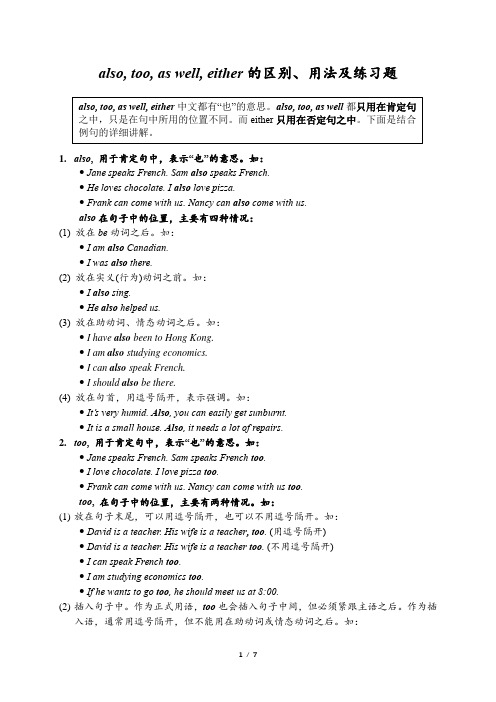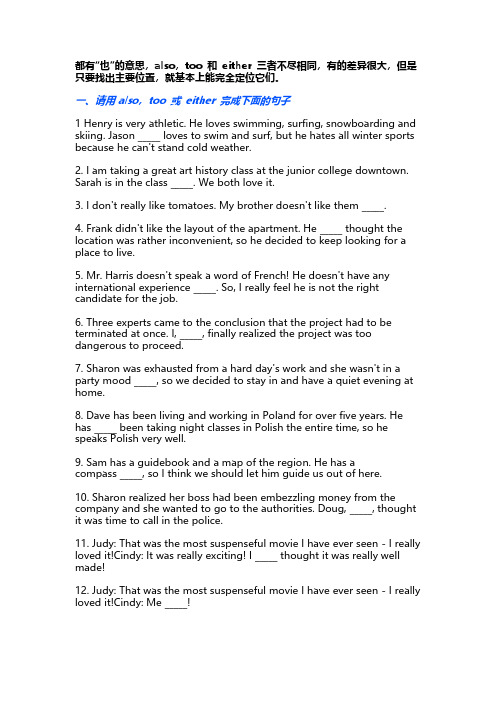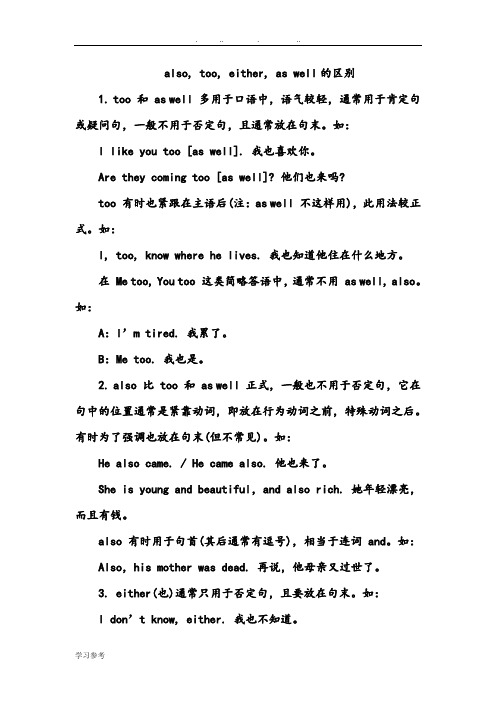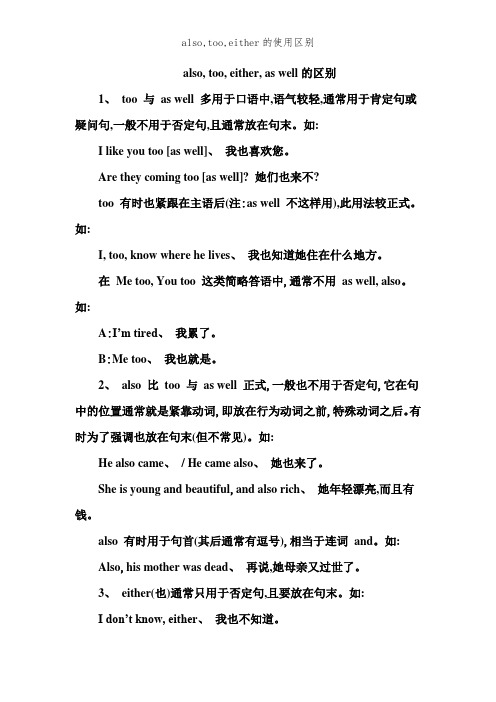(完整版)also,too和either区别练习
- 格式:doc
- 大小:25.00 KB
- 文档页数:2

also, too, as well, either的区别、用法及练习题1.also, 用于肯定句中,表示“也”的意思。
如:Jane speaks French. Sam also speaks French.He loves chocolate. I also love pizza.Frank can come with us. Nancy can also come with us.also在句子中的位置,主要有四种情况:(1) 放在be动词之后。
如:I am also Canadian.I was also there.(2) 放在实义(行为)动词之前。
如:I also sing.He also helped us.(3) 放在助动词、情态动词之后。
如:I have also been to Hong Kong.I am also studying economics.I can also speak French.I should also be there.(4) 放在句首,用逗号隔开,表示强调。
如:It’s very humid. Also, you can easily get sunburnt.It is a small house. Also, it needs a lot of repairs.2.too, 用于肯定句中,表示“也”的意思。
如:Jane speaks French. Sam speaks French too.I love chocolate. I love pizza too.Frank can come with us. Nancy can come with us too.too, 在句子中的位置,主要有两种情况。
如:(1)放在句子末尾,可以用逗号隔开,也可以不用逗号隔开。
如:David is a teacher. His wife is a teacher, too. (用逗号隔开)David is a teacher. His wife is a teacher too. (不用逗号隔开)I can speak French too.I am studying economics too.If he wants to go too, he should meet us at 8:00.(2)插入句子中。

also too either as well的区别和用法(实用版)目录1.引言2.also, too, either 和 as well 的含义和用法的区别3.also 和 too 的用法4.either 的用法5.as well 的用法6.总结正文一、引言在英语中,副词"also", "too", "either"和"as well"经常被用来表示不同的意思。
尽管它们在某些情况下可以互换使用,但它们之间仍然存在一些关键的差异。
在本文中,我们将详细讨论这些差异以及如何正确使用这些副词。
二、also, too, either 和 as well 的含义和用法的区别1.also:也,用于表示某个观点或行为也适用于另一个观点或行为。
例句:I like apples and I also like oranges.(我喜欢苹果,我也喜欢橙子。
)2.too:也,用于表示强调,通常放在句尾。
例句:I am very tired, too.(我也非常累。
)3.either:(两者之中)任何一个,用于表示两者之间的选择。
例句:You can choose either a book or a magazine.(你可以选择一本书或一份杂志。
)4.as well:也,用于表示某个观点或行为同样适用于另一个观点或行为。
通常放在句尾。
例句:She is a great dancer and a great singer as well.(她是一名优秀的舞者,同时也是一名优秀的歌手。
)三、also 和 too 的用法1.also:用于句中,表示两个观点或行为之间的联系。
例句:He is a talented artist and he also plays the piano.(他是一名有才华的艺术家,而且他也会弹钢琴。
)2.too:用于句尾,表示强调。

都有“也”的意思,also,too 和either 三者不尽相同,有的差异很大,但是只要找出主要位置,就基本上能完全定位它们。
一、请用 also,too 或either 完成下面的句子1 Henry is very athletic. He loves swimming, surfing, snowboarding and skiing. Jason _____ loves to swim and surf, but he hates all winter sports because he can't stand cold weather.2. I am taking a great art history class at the junior college downtown. Sarah is in the class _____. We both love it.3. I don't really like tomatoes. My brother doesn't like them _____.4. Frank didn't like the layout of the apartment. He _____ thought the location was rather inconvenient, so he decided to keep looking for a place to live.5. Mr. Harris doesn't speak a word of French! He doesn't have any international experience _____. So, I really feel he is not the right candidate for the job.6. Three experts came to the conclusion that the project had to be terminated at once. I, _____, finally realized the project was too dangerous to proceed.7. Sharon was exhausted from a hard day's work and she wasn't in a party mood _____, so we decided to stay in and have a quiet evening at home.8. Dave has been living and working in Poland for over five years. He has _____ been taking night classes in Polish the entire time, so he speaks Polish very well.9. Sam has a guidebook and a map of the region. He has acompass _____, so I think we should let him guide us out of here.10. Sharon realized her boss had been embezzling money from the company and she wanted to go to the authorities. Doug, _____, thought it was time to call in the police.11. Judy: That was the most suspenseful movie I have ever seen - I really loved it!Cindy: It was really exciting! I _____ thought it was really well made!12. Judy: That was the most suspenseful movie I have ever seen - I really loved it!Cindy: Me _____!13. I am really tired, and I don't feel like going out tonight _____. Let's just stay home tonight.14. I don't really feel like going out tonight, and I am _____ really tired. Let's just stay home tonight.15. Jim is an amazing skiier, and he loves to snowboard _____.二、答案、参考翻译及解析1. also亨利很有运动天赋。

tooeitheralso的用法和区别"Too", "either"和"also"都是英语中常见的副词,它们在句子中有着不同的用法和含义。
1. "Too" (也/太):- 当"too"用于表示也时,它可以放在句子中一个肯定句的末尾,用来加强陈述。
例如:I like pizza too.(我也喜欢披萨。
)- 当"too"用于表示过度的意思时,它通常放在形容词或副词的前面,用来描述一些事物的程度超过了正常或期望的范围。
例如:The coffee is too hot to drink.(咖啡太烫了,无法喝。
)- "too"也可以用在肯定句的前面,表示"也"。
此时,句子中常使用倒装结构。
例如:Too difficult is the problem for me to solve.(对我来说这个问题也太难了。
)- "too"可以作为连词,引导结果状语从句,表示一个结果使一些行为变得困难或不可能。
例如:She overslept, too, which made her arrive late to work.(她也睡过头了,这使她上班迟到了。
)2. "Either" (也/两者之一):- "either"表示在两个或多个人、物或观点中的一个。
例如:You can choose either red or blue.(你可以选择红色或蓝色。
)- "either"可以放在句子中一个否定句的末尾,表示"也"。
例如:I don't like coffee either.(我也不喜欢咖啡。
)- "either"也可以引导让步状语从句,表示出乎意料的结果。

also, too, either, as well的区别1. too 和 as well 多用于口语中,语气较轻,通常用于肯定句或疑问句,一般不用于否定句,且通常放在句末。
如:I like you too [as well]. 我也喜欢你。
Are they coming too [as well]? 他们也来吗?too 有时也紧跟在主语后(注:as well 不这样用),此用法较正式。
如:I, too, know where he lives. 我也知道他住在什么地方。
在 Me too, You too 这类简略答语中,通常不用 as well, also。
如:A:I’m tired. 我累了。
B:Me too. 我也是。
2. also 比 too 和 as well 正式,一般也不用于否定句,它在句中的位置通常是紧靠动词,即放在行为动词之前,特殊动词之后。
有时为了强调也放在句末(但不常见)。
如:He also came. / He came also. 他也来了。
She is young and beautiful,and also rich. 她年轻漂亮,而且有钱。
also 有时用于句首(其后通常有逗号),相当于连词 and。
如:Also,his mother was dead. 再说,他母亲又过世了。
3. either(也)通常只用于否定句,且要放在句末。
如:I don’t know, either. 我也不知道。
He hasn’t finished it,either. 他也还没有做完。
注:有时在肯定句之后跟一个否定句,可能用 too,also。
如:He came, but she didn’t also came. 他来了,但她没有也一起来。
He went to Washington, but not to New York too. 他去了华盛顿,但并不是也去了纽约。
比较:He didn’t buy a computer, and she didn’t either. 他没有买电脑,她也没有买。

also, too, either, as well的区别1、too 与as well 多用于口语中,语气较轻,通常用于肯定句或疑问句,一般不用于否定句,且通常放在句末。
如:I like you too [as well]、我也喜欢您。
Are they coming too [as well]? 她们也来不?too 有时也紧跟在主语后(注:as well 不这样用),此用法较正式。
如:I, too, know where he lives、我也知道她住在什么地方。
在Me too, You too 这类简略答语中,通常不用as well, also。
如:A:I’m tired、我累了。
B:Me too、我也就是。
2、also 比too 与as well 正式,一般也不用于否定句,它在句中的位置通常就是紧靠动词,即放在行为动词之前,特殊动词之后。
有时为了强调也放在句末(但不常见)。
如:He also came、/ He came also、她也来了。
She is young and beautiful,and also rich、她年轻漂亮,而且有钱。
also 有时用于句首(其后通常有逗号),相当于连词and。
如:Also,his mother was dead、再说,她母亲又过世了。
3、either(也)通常只用于否定句,且要放在句末。
如:I don’t know, either、我也不知道。
He hasn’t finished it,either、她也还没有做完。
注:有时在肯定句之后跟一个否定句,可能用too,also。
如:He came, but she didn’t also came、她来了,但她没有也一起来。
He went to Washington, but not to New York too、她去了华盛顿,但并不就是也去了纽约。
比较:He didn’t buy a computer, and she didn’t either、她没有买电脑,她也没有买。
(完整版)also,too和either区别练习知识点补给站一.用too,also,either或as well填空:1)I'll go to see the film,_________.2)If you don't come here,I shouldn't, ______ .3)I,________ ,will help him.4)Jack can speak Chinese,and his brother can ____ speak Chinese.二.用look(at), see, watch, read 填空1.Let's go to ________a movie.2.I often _____English in the morning.3.He often _______TV in the evening.4.Let me _________ your picture.三. 用good, well, nice, fine填空1、This kind of bicycle sells____?A.goodB.wellC.niceD.fine2、This kind of shirt looks ____and sells____.A:nice. well B : well, nice C : good,good3、The flowers smell so ?A:well B:nice C:wonderfully D:nicely4、The flowers look very _______.A.niceB.nicelyC.beautifullyD.well5、The music sounds _______.A.wellB.nicelyC.goodD.beautifully四.with的用法一、with表拥有某物Mary married a man with a lot of money . 马莉嫁给了一个有着很多钱的男人。
1. (一)also, too, either , as well(1)also “也”,用于肯定句中,”行前be后”。
(2)too, “也”,用于肯定句句末,用逗号与前面句子隔开。
(3)as well, "也",用于肯定句句末,无需用逗号与句子隔开。
(4)either, "也(不)",用于否定句句末,用逗号与前面句子隔开。
(二)either pron, (两者中)任意一个,可以替换为each, 反义词neither.e.g There are so many cars on either/each side of the street.There are so many cars on both sides of the street.( both 两者都,常用于both...and... ...和...都...e.g Both my father and my mother love me.)-Which do you prefer, milk or coffee?- Either is OK.-Which do you prefer, milk or coffee?-Neither. I want a cup of tea.(三)either...or... 要么...要么...;或者...或者...e.g I think she is either Chinese or Japanese.I am going to buy either a camera or a phone.Either you or she comes with me to the party.Either she or you come with me to the party.注:either..or;neither...nor; not only...but also...结构连接两个成分做主语,谓语动词的单复数遵循“就近原则”。
三者都有”也“的意思,其中 also 和 too 可以以相同的方式使用。
然而,我们把它们放在不同的地方,在肯定句中使用 also 和 too,而在否定句中则使用 either。
其中,also 放在 be 动词和在情态动词之后,实义动词之前,而 too 放在句尾,此时它的意思跟 also 一样,所以解答此类的题目,只需判断句型或位置就可以了。
一、用 also,too 或 either 完成下列句子1、I don’t like cold climates. I don't think you like it _____.2、My friends are going to college next year. I am _____ going to college next year.3、My wife is a diligent engineer. I am a diligent engineer _____.4、I love swimming. My son loves it _____.5、Today the weather isn't so good. It wasn't really good yesterday _____.6、I eat a lot more than an average person. My brother _____ eats a lot.7、A bear can run very fast. A tiger runs very fast _____.8、I am not from Italy. My friend isn't from Italy _____.9、Paris is a big city. Madrid is _____ a big city.10、French is a difficult language to learn. Latin is a difficult language to learn _____.11、Henry is very athletic. He loves swimming, surfing, snowboarding and skiing. Jason _____ loves to swim and surf, but he hates all winter sports because he can't stand cold weather.12、I am taking a great art history class at the junior college downtown. Sarah is in the class _____. We both love it.13、I don't really like tomatoes. My brother doesn't like them _____.14、I am really tired, and I don't feel like going out tonight _____. Let's just stay home tonight.15、I don't really feel like going out tonight, and I am _____ really tired. Let's just stay home tonight.二、答案及解析1、either解析:在否定句(don't)中用 either。
also, too, either, as well的区别这四个副词均可表示“也”,区别如下:1.too 和as well 多用于口语中,语气较轻,通常用于肯定句或疑问句,一般不用于否定句,且通常放在句末。
如:I like you too [as well]. 我也喜欢你。
Are they coming too [as well]? 他们也来吗?too 有时也紧跟在主语后(注:a s well 不这样用),此用法较正式。
如:I, too, know where he lives. 我也知道他住在什么地方。
在Me too, You too 这类简略答语中,通常不用as well, also。
如:A:I’m tired. 我累了。
B:M e too. 我也是。
2.also 比too 和as well 正式,一般也不用于否定句,它在句中的位置通常是紧靠动词,即放在行为动词之前,特殊动词之后。
有时为了强调也放在句末(但不常见)。
如:He also came. / He came also. 他也来了。
She is young and beautiful,a nd also rich. 她年轻漂亮,而且有钱。
also 有时用于句首(其后通常有逗号),相当于连词and。
如:Also,h is mother was dead. 再说,他母亲又过世了。
3.either(也)通常只用于否定句,且要放在句末。
如:I don’t know, either. 我也不知道。
He hasn’t finished it,e ither.他也还没有做完。
注:有时在肯定句之后跟一个否定句,可能用too,a lso。
如:He came, but she didn’t also came. 他来了,但她没有也一起来。
He went to Washington, but not to New York too. 他去了华盛顿,但并不是也去了纽约。
知识点补给站
一.用too,also,either或as well填空:
1)I'll go to see the film,_________.
2)If you don't come here,I shouldn't, ______ .
3)I,________ ,will help him.
4)Jack can speak Chinese,and his brother can ____ speak Chinese.
二.用look(at), see, watch, read 填空
1.Let's go to ________a movie.
2.I often _____English in the morning.
3.He often _______TV in the evening.
4.Let me _________ your picture.
三. 用good, well, nice, fine填空
1、This kind of bicycle sells____?
A.good
B.well
C.nice
D.fine
2、This kind of shirt looks ____and sells____.
A:nice. well B : well, nice C : good,good
3、The flowers smell so ?
A:well B:nice C:wonderfully D:nicely
4、The flowers look very _______.
A.nice
B.nicely
C.beautifully
D.well
5、The music sounds _______.
A.well
B.nicely
C.good
D.beautifully
四.with的用法
一、with表拥有某物
Mary married a man with a lot of money . 马莉嫁给了一个有着很多钱的男人。
__________________________________________________ 我经常梦想有一个带花园的大房子。
二、with表用某种工具或手段
Tom drew the picture with a pencil . 汤母用铅笔画画。
__________________________________________________ 他在用铅笔写字。
三、with 表原因或理由
John was in bed with high fever . 约翰因发烧卧床。
__________________________________________________ 他因高兴跳起来。
四、with 表“带来”,或“带有,具有”,在…身上,在…身边之意
Do you have money with you . 身上带着钱吗?
__________________________________________________ 随身带伞,以防下雨。
五、with表示让步,“虽有,尽管”
With good teachers and warmhearted classmates ,the new comer feels lonely .
虽有着好老师和热心的同学,这个新来的还是感觉孤独。
__________________________________________________ 有着钱和名誉,他还是不快乐。